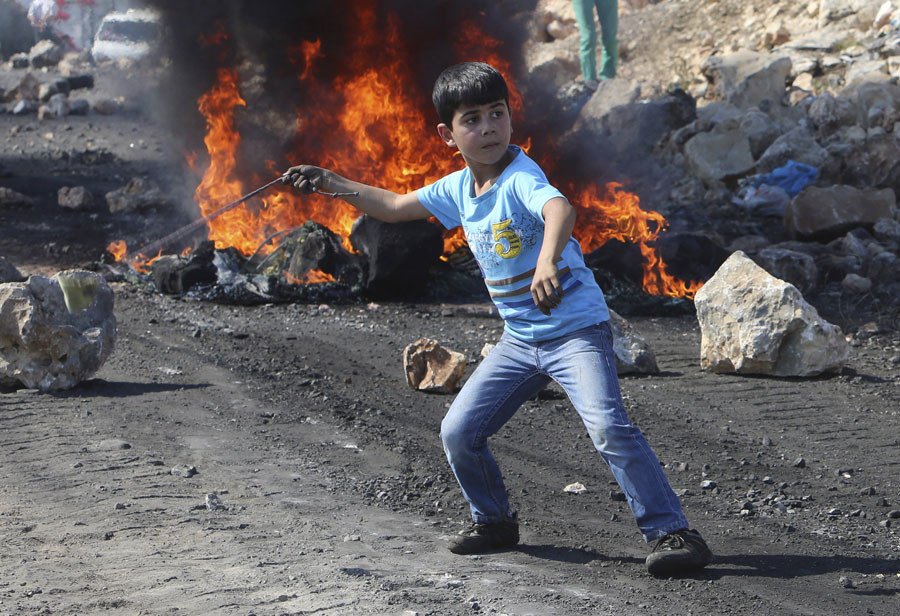'Choked, beaten & strip-searched': HRW slams Israel for ‘abusive arrests’ of Palestinian kids
Israeli security forces have performed “abusive arrests” of Palestinian children, chocking, beating and threatening kids as young as 11, a global watchdog said in a report.
“Israeli security forces have used unnecessary force to arrest or detain Palestinian children as young as 11,” a report published by the Human Rights Watch (HRW) said Monday.
According to the group Israeli security forces “have choked children, thrown stun grenades at them, beaten them in custody, threatened and interrogated them without the presence of parents or lawyers, and failed to let their parents know their whereabouts.”
HRW said it interviewed several Palestinian boys and a girl aged from 11 to 15 who were arrested by Israeli security forces in the period from March to December 2014.
The children told HRW that “Israeli authorities did not inform parents of their child’s arrest and interrogated the children without permitting them to speak to a parent or lawyer prior to the interrogation.”
An 11-yer-old Rashid said he was attacked by a stun grenade and was put “in a chokehold” when Israeli arrested him for throwing stones in November. The boy added that officers “put a black bag over his head, threatened him with beatings, and kicked him in the shin while taking him for interrogation.”
“When he got home [after being arrested] he had nightmares,” Rashid’s father said. “He woke up screaming for four or five nights in a row.” Rashid told Human Rights Watch that he dreamed of being arrested, “over and over again,” and was scared of going to school.
#Israel forces’ mistreatment of #Palestine kids at odds w claim to respect children's rights https://t.co/kvoO4c2Dm3pic.twitter.com/iN7MRCO3pe
— Lotte Leicht (@LotteLeicht1) July 20, 2015One more boy, Fares Shyukhi, 15, said he was “strip-searched, slapped and kicked” by Israeli security forces, who later jailed him several times on suspicion of throwing Molotov cocktail at a settlement in his neighborhood.
“There were seven police; they said ‘If you don’t talk we’ll beat you.’ I refused and they punched and kicked me. For about five minutes. Then they took me to a cell until afternoon the next day…Then the interrogator said I had to sign three papers, in Hebrew. I couldn’t read them but I didn’t hesitate,” Fares said.
Ahmad Abu Sbitan, 11, was put “in a chokehold” as Israeli forces were arresting him outside the gates of his school.
The mother of the girl interviewed by HRW in the report, a 14-year-old Malak Al-Khatib, said that “four soldiers beat her [Malak] with something like a baton” during the arrest until she lost consciousness.
“While on the ground, they kicked her and one soldier stepped on her neck,” the she added.
The report explained its decision to focus on the child abuse because local human rights organizations and media had indicated a “pattern” to the arrests. The report coincides with a similar one issued by UNICEF in 2013. The Israeli response to the UNICEF report was a commitment to collaborate with UNICEF to end the abuses. But according to an update from 2014, little progress has been made.

In 2014, the Israeli Military attempted to introduce a “pilot project” of issuing summonses to children’s families who were to be questioned instead of the usual nighttime arrest raids the military had previously conducted. However, the army dropped the project, citing the increase in violence during the summer 2014. In 2013, the Israeli military had reported that it had arrested 162 children in nighttime raids.
The head of HRW, Sarah Leah Whitson, called on the United States to put pressure on their ally, Israel, to end the abuses.
“Israeli forces’ mistreatment of Palestinian children is at odds with its claim to respect children's rights,” she said adding the abuses were systematic and ongoing, while Israel could easily end them if they were “serious” about it.
There was no immediate comment to the report from Israel or the Israeli Military. However, Israel is a frequent critic of HRW, considering them biased against Israel and ignoring stories that “do not fit into their narrative.”












